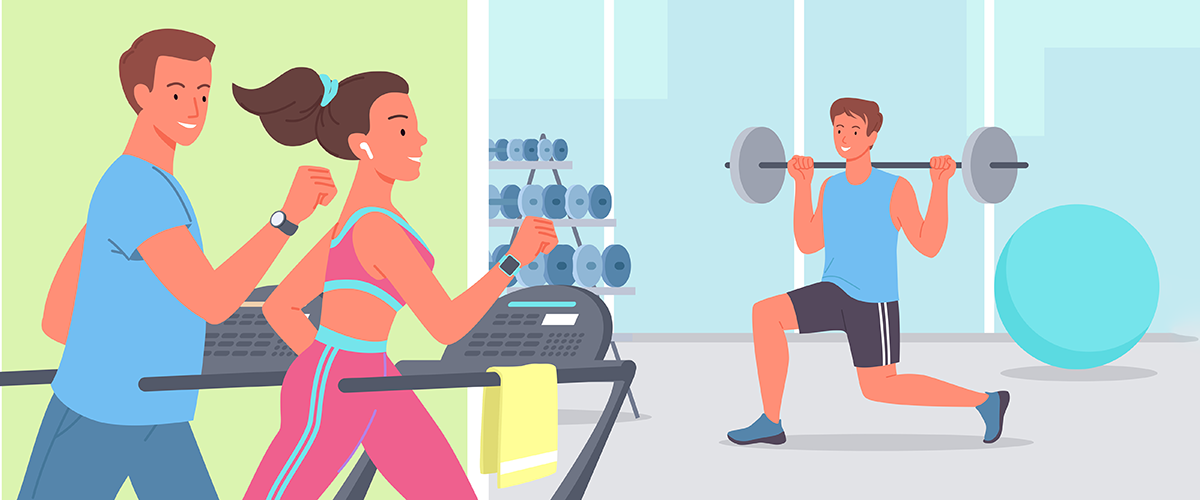Every day, we are constantly managing the flow of our energy. Whether we are in the kitchen preparing a tasty omelette, taking a walk with our pets, or trying to finish tasks etc., these actions all require proper energy management. However, let’s take a step back for a second and ask ourselves a few questions. For example, ‘How do you get energy?’, ‘How can I improve my energy levels?’, or how about, ‘How can exercise and moving more actually help boost my mood and energy?’ In this blog, we will explore how exercise can help us to have more energy at work.
What gives us energy?
Right off the bat, energy, in this case is referring to our ability to perform mental and physical activities. Now, it goes without saying that we naturally gain energy from the food that we consume, such as carbohydrates, fats and proteins. These are known as macronutrients.1 We need them in large quantities, relative to micronutrients, like vitamins and minerals.
Let’s use a car as an analogy. You fill up your gas tank, but you let it sit in the garage. The car engine does not benefit from this. The point is, while consuming food does 'refuel the tank'; this action alone is not enough for optimal health. In other words, without exercise, energy from food can lead to negative effects like tiredness, fatigue, or even specifically, excessive blood sugar, a precondition for diabetes. Exercise enhances our body's ability to utilise food efficiently by increasing blood flow and oxygen intake, thereby providing us with more energy.
In addition, there are beneficial mental health effects that we cannot overlook. Euphoria; a 'natural high' feeling that induces a general sense of happiness, stress reduction and improved mood. These are all possible, thanks to endorphins.2 These are chemicals that the body releases in response to exercise. Think of it as giving your car a fresh coat of paint and detailing. Ultimately, 'exercising' your car makes it run better, look and feel great.
Applying the benefits of exercise to (your) work productivity


Exercise can generally be split into two main categories, cardio and resistance training. Cardio exercise refers to workouts and activities that help strengthen your cardiovascular health (think of jogging, sprinting, swimming, cycling, etc), while resistance training (or strength training) refers to exercises that build muscle, such as weightlifting or body weight exercises.
Now, any form of exercise helps to reduce stress and anxiety. This can especially be beneficial at work where mental resilience helps us to push past the various challenges and difficulties we can encounter. Feeling a bit stressed after work? Go run a few miles, or lift some weights.
With exercise, we can definitely improve our energy levels and mental health. However, there is one more benefit you should know. As previously mentioned, exercise increases blood flow. In the brain, this results in the growth of new blood vessels, neurons, and nerve cells. 3,4,5 In short, exercise can help enhance our professional performance. Ultimately, our brain function and cognition can benefit immensely. Approaching our final car analogy, just as it needs high-quality fuel and a well-maintained engine to embark on its journey, our body needs not only a balanced diet, but also regular exercise in order to lead a vibrant and energetic life. Food fuels the body, but exercise is the engine that maximises the use of that fuel.
Colleagues on the value of exercise
Here is feedback from Florence Perrault and Paulino López on how they implement exercise in their lives and how this helps them to have more energy at work:


‘I’ve always exercised as I grew up and during my professional career. Participating in sports was first the easiest way to quickly clear my mind and reset my energy. Later on, I discovered that running was boosting my creativity; I’ve always had the best ideas to solve issues while exercising outside. Finally, ultra running taught me discipline and resilience, and increased my self-confidence and capacity to better listen to myself. I believe all of that reinforces my leadership.’ – Florence Perrault, Arnhem


For Paulino López, Spain: ‘I’ve always loved endurance (prolonged exercise) training. When I was a student, I was part of a cycling team. Then, when I started to work, I took my running shoes every time I was travelling, which was quite often. Those running shoes always helped me gain strength, long-term energy and balance during working weeks. Shorter or longer, I always tried to start the work day by running or static biking, in addition to warm-up exercises. I’ve never found a better coffee to start the day. Endurance training also provides a special state of mind—equivalent to meditation—that resets and prepares the brain to face new challenges and helps you feel fresh and be tempered and determined. Early morning training became an essential part of me that has accompanied me in all subsequent stages of my life over the last 30 years ... I’ve loved pursuing some high-demand sport-related challenges, such as long distance triathlons. The Ironman Triathlon, for example, has given me an extra power, temperance and resistance that I apply to work and life.’
So, are you ready to get started on your journey? Fire up the engine, hit the road with a balanced diet, and embrace regular exercise. Begin laying the foundation to ensure your journey in life is one filled with vigour, resilience, and boundless energy. Ready, set, go!


Ferro Swedianto
Web Team Intern, Medline Europe
Ferro is an international student from Indonesia, currently doing his bachelor's degree in communications at HAN University of Applied Sciences. He is completing his graduation internship at Medline Europe. Amongst his favourite activities are writing, playing guitar, and endurance sports. Learn more on LinkedIn.
References:
1. British Heart Foundation 2022, What are macronutrients, accessed 14 February 2024, <https://www.bhf.org.uk/>
2. Harvard Health 2021, Endorphins: The brain’s natural pain reliever, accessed 30 December 2023, <https://www.health.harvard.edu/>
3. Harvard Health 2014, Regular exercise changes the brain to improve memory, thinking skills, accessed 30 December 2023, <https://www.health.harvard.edu/>
4. NIH RESEARCH MATTERS 2018, Exercise and new nerve cell growth in Alzheimer’s disease, accessed 30 December 2023, <https://www.nih.gov/>
5. Neuroscience 2023, Exercise and the Brain: The Neuroscience of Fitness Explored, accessed 30 December 2023, <https://neurosciencenews.com/>

